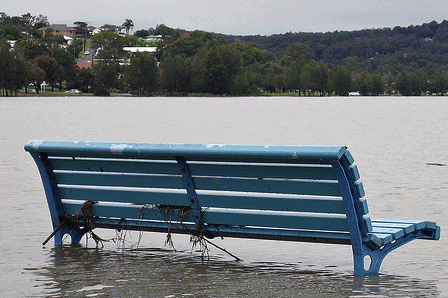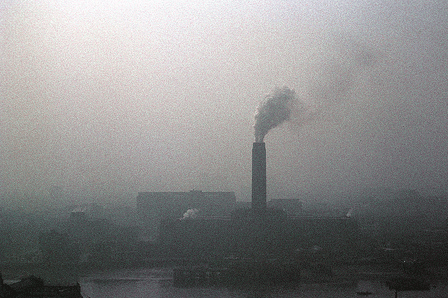Erstellt am: 15. 6. 2012 - 16:46 Uhr
What Can We Expect From Rio + 20?
Rio + 20: A Saturday Reality Check Special, 16th June, 12 noon on FM4.
Next week, 130 leaders from 190 countries will gather inside the vast Riocentro Convention Centre in Rio de Janeiro to discuss sustainable development. The gathering, between the 20th and the 22nd of June, is the third UN Earth Summit, a mega-conference designed to shape a future that will be more green and less mean.
But what is sustainable development? "It’s a process that ultimately leads to well-being and prosperity and equal opportunities and justice for everybody," says Michael Hauser from the Centre for Development Research at the BOKU in Vienna, "It's about access to resources and ensuring that everyone enjoys, for example, access to food."
The twin aims of development and environmental protection don't seem like immediate bedfellows. Currently we live in a world where the top 20% consume 85% of the world`s resources, while many go hungry and already we are making demands on our resources that nature cannot replenish fast enough. According to the most recent Living Planet report, global demand for natural resources has doubled since 1996 and that is now 50% higher than the regenerative capacity of the planet.
Yet we need to raise the bottom two billion out of poverty which would entail a natural increase in their levels of consumption (currently 1/60th of Western consumption). How do you square that equation? Mohan Munasingue, the Vice-Director of the Intergovernmental Panel on Climate Change, puts it baldly: "We simply do not have enough resources to raise the poor out of poverty with current patterns of consumption."
So Rio will demand compromises from those who consume the most, and yet some very important players, the leaders of the greatest per capita consuming and polluting nations, have not deemed it necessary to travel to Brazil. Camilla Toulmin, the Director of the International Institute for Environment & Development (IIED), points out that, since "much of the unsustainability of our current planetary system is a consequence of overconsumption in the G8 nations", this is a dereliction of duty. "It's at one level devastating that none of our global leaders has made a pitch for making Rio + 20 a landmark event."
Of the G8 leaders only presidents Francois Hollande of France and Vladimir Putin are bothering to attend. "The G8 seems to have completely bowed out from having a role in shaping the next phase of sustainable development," complains Toulmin. There will be a shift in influence to the middle income countries such as hosts Brazil, as well as India, China and Colombia all of which will be represented by their national leaders. "It would be great," says Toulmin, "if, having already made themselves super-sustainable, the rich countries had passed on the baton, but the truth is of course that they have nothing to be proud of at all."
To an extent the West's lethargy might seem forgivable. Our leaders have some pressing problems at home, not least the Eurozone debt-crisis. But the United Nations Assistant Secretary General Thomas Stelzer warns against inaction: "We need to act because otherwise we can’t survive. There are limits to how much we can draw from the future. Nature doesn’t negotiate, it reacts." For example, the mildest prognosis of the economic and social fall-out from climate change would make the debt-crisis look like a storm in a tea cup.
Stelzer says that addressing the inequality in the world is also in our interest. "Only integrated, balanced societies provide peace and security. Our societies are fractured. Where the wealth gaps are too great and the polarization too acute we'll fall apart and then often end in violence, insecurity and a dramatic decrease in standard of living." There is bound to be mass south to north migration, for example, unless we can help create the conditions in poor countries to offer a dignified standard of living and hope for the future.
Stelzer would like to see a return to the optimistic spirit that surrounded the original Rio Earth Summit in 1992 which is often seen as the moment when environmental issues became truly mainstream. The concept of the Earth Summit had debuted in Stockholm in 1972 but according to Camilla Toulmin Rio marked the “the first time that sustainability had really been taken seriously by governments as an important consideration in economic policy.” She points out that "it wasn't until 1992 that you saw governments creating environment ministries and that it was finally recognized that we had to set up global agreements for things like climate change, biodiversity and desertification."
But over the past 20 years we have learned that having these global agreements are of little value unless there is real political will to implement their aims. Toulmin describes governments as "short-sighted and fearful of the political consequences of their actions." It's the democratic dilemma summed up well by Luxembourg's Prime Minister Jean-Claude Juncker when he was talking about the Eurozone crisis:
"We all know what to do, we just don't know how to get re-elected after we've done it."
This time around our leaders aren't expected to be asked to sign up to any legally binding treaties anyway. Instead, it's merely hoped that the result will be a set of shared principles and soft targets. According to Toulmin "the best legacy we can hope to get is the agreement to develop over the next couple of years a set of global sustainability goals that would build on the Millennium Development Goals which they would succeed in 2015." Mohan Munasingue would like to see leaders agreeing to some Millennium Consumption Goals which would involve the rich world would pledging to gradually reduce its consumption to enable the poor world to increase its share of resources.
To be frank, all of this is very airy-fairy given the miserable progress made on environmental and development issues since the last Earth Summit. In Rio 20 years ago a United Nations Framework Convention on Climate Change was established, but since then carbon emissions have increased by 40% in the past 20 years. Rio 1992 also set up the Convention on Biological Diversity but species loss is accelerating. Rio in 1992 pledged to end hunger but in 2012 one in six people remain undernourished. Faced with these facts it seems that Rio + 20 lacks ambition from the outset whether or not or European leaders deem it necessary to pay lip service to its worth.
Yet it's no good just complaining that our leaders are feckless and short-sighted of course. Camilla Toulmin says civil society has the prime role in making saving the planet seem a political priority: "No leader will have the courage to move in the right direction unless they have a set of domestic interests and constituents really pushing them hard to take action on sustainability."
Dieses Element ist nicht mehr verfügbar





